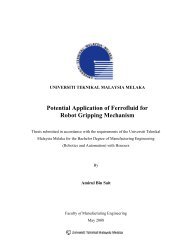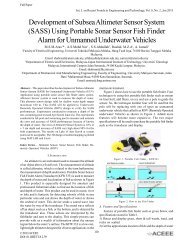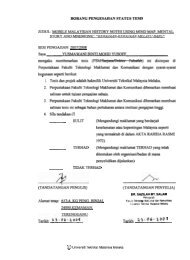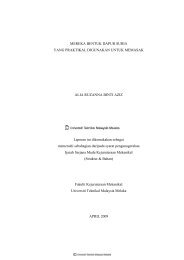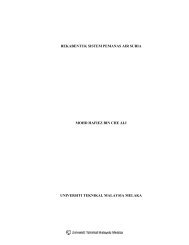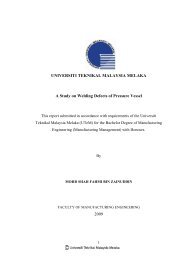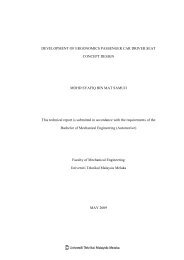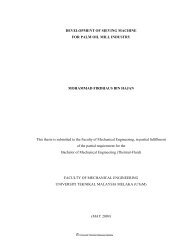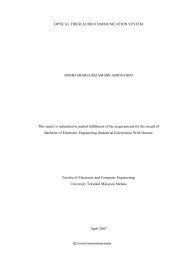Brand, Identity and Reputation: Exploring, Creating New Realities ...
Brand, Identity and Reputation: Exploring, Creating New Realities ...
Brand, Identity and Reputation: Exploring, Creating New Realities ...
Create successful ePaper yourself
Turn your PDF publications into a flip-book with our unique Google optimized e-Paper software.
Importance of Country Image to Mega-event Sponsorship <strong>Br<strong>and</strong></strong>s: Comparison of Vancouver Winter Olympics<br />
<strong>and</strong> South Africa FIFA World Cup<br />
John Nadeau, Nipissing University, Canada<br />
Louise Heslop, Carleton University, Canada<br />
Norm O‘Reilly, University of Ottawa, Canada<br />
Sonja Verwey, University of Johannesburg, South Africa<br />
Anahit Armenakyan, Carleton University, Canada<br />
Erdinç Çakmak, NHTV Breda University of Applied Sciences, Netherl<strong>and</strong>s<br />
Introduction<br />
Mega-events are an elite category of events that are characterized by the extraordinarily large presence, reach <strong>and</strong><br />
audience of the event (Florek, Breitbarth <strong>and</strong> Conejo, 2008). For corporate sponsor/marketers they represent a<br />
communications channel to broadly engage customers <strong>and</strong> potential customers on the values <strong>and</strong> meanings of their<br />
br<strong>and</strong>s. Indeed, mega-events sponsorship revenues indicate the perceived marketing value of the opportunity. For<br />
example, the Vancouver 2010 Winter Olympics generated CDN$756 million in sponsorship revenues (Seguin et al.,<br />
2010).<br />
Beyond the sheer size <strong>and</strong> reach of mega-events, they are often described in the context of their host country. The<br />
rotational hosting nature of many of these events (e.g. Olympic Games, FIFA World Cup, Commonwealth Games, etc.)<br />
means that different countries create the backdrop for the event itself. A leading motivation for host locations is to<br />
enhance the image of the country at home <strong>and</strong> abroad (Heslop et al. 2010). While the views of residents of the host<br />
country towards mega-events have been investigated previously, little research appears to examine resident views at the<br />
intersection of host country, mega-events <strong>and</strong> sponsor images.<br />
Attribution theory provides an explanation as to how people draw inferences about an actor based on character or<br />
situational information (Kelley <strong>and</strong> Michela, 1980). This theory can be applied to underst<strong>and</strong> the evaluations that<br />
people make about an event based on their views of the host country <strong>and</strong> its people, even in the absence of direct or<br />
substantive experiences (e.g. stereotypes). Indeed, character-based information is often favoured over circumstance in<br />
influencing behaviour (Heine <strong>and</strong> Buchtel, 2009).<br />
The purpose of this paper is to compare the pattern of relationships among the images that host country residents hold<br />
about the host country, the mega-event <strong>and</strong> a major sponsor for the event in the context of two different mega-events --<br />
the Vancouver 2010 Winter Olympic Games <strong>and</strong> the 2010 FIFA World Cup in South Africa. Comparing across megaevents<br />
may allow some initial insight into the variable of sponsor associations <strong>and</strong> br<strong>and</strong>ing opportunities arising from<br />
mega-event sponsorship.<br />
Study 1 – Vancouver Winter Olympics<br />
The Olympic Games are a premier athletic event where countries send their top athletes to participate in sporting<br />
competitions for national pride <strong>and</strong> personal ambition. The Summer <strong>and</strong> Winter Olympic Games alternate every two<br />
years. Both events meet the definition of a mega-event with sprawling facilities required to host the event, large<br />
number of participating countries, <strong>and</strong> enormous attention by spectators worldwide (Majid et al., 2007). This study<br />
explores the pattern of relationships among country, mega-event, <strong>and</strong> sponsor evaluative images in the context of the<br />
Winter Olympic Games that were hosted by Canada in Vancouver during 2010.<br />
The data for this study was collected during the Vancouver Olympic Games <strong>and</strong> as part of a larger multi-wave, Canadawide,<br />
panel-based study; therefore, only a portion of the data is reflected here. The questionnaire collected views about<br />
the host country, the Olympic Games <strong>and</strong> Coca-Cola as a TOP Olympic sponsor. The total sample size for this wave of<br />
data was 970 respondents, including 57.4% males with a median age in the 31-50 years range, <strong>and</strong> 55% having obtained<br />
a college diploma or less.<br />
Respondents‘ evaluations on a scale of 1 (least favourable) to 7 (most favourable) for the host/home country <strong>and</strong> people,<br />
the Olympic Games, <strong>and</strong> the top sponsor are presented in Table 1. The highest evaluations were reported about the host<br />
country followed evaluations of the event itself <strong>and</strong>, finally, the evaluations of the event sponsor. It is not surprising<br />
that the evaluations of sponsor are lower than the mega-event or the host country evaluations given the prominence of<br />
the event <strong>and</strong> country <strong>and</strong> the associative nature of sponsorship.<br />
To assess the patterns of relationships, a structural equation model (SEM) was tested using LISREL. The results are<br />
presented in Figure 1 <strong>and</strong> demonstrate a relational pathway exists whereby the image of the host country <strong>and</strong> people is<br />
related to the image evaluation of the mega-event sponsor through the evaluation of the mega-event itself. The model<br />
175



